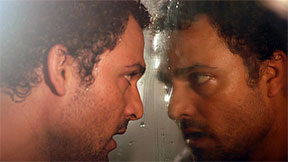Finding ourselves

On the last day of the Tribeca Film Festival, I saw first-time Iranian-American director Hamid Rahmanian's Day Break. Description was:
In Iran, a murder conviction allows for the victim's family to choose capital punishment or forgiveness for the perpetrator. This harrowing, existential film shows a convicted murderer trapped in painful purgatory as his family distances themselves from him and his victim's family repeatedly delays their ultimate decision.The film was great. Even though the screening I saw was at 10:15 on a Sunday morning, the theater was mostly full, and the audience Q&A was the most enthusiastic I saw at this fest.
The story is told in a documentary-style, and although there's some over-acting, the subject matter is so interesting and compelling that you're totally sucked in. I'm obviously more familiar with Iran and its culture than most Americans, but even I was suprised at the humanity of its justice system, as portrayed--the prisoners ate together in a communal style, individual jail cell doors were left open and the prisoners freely mingled (especially in the evening), the guards treated inmates as human.
The thing most people don't realize about Iran is that the United Nations regularly cites its government programs as a model for other developing nations to follow--it has a critical mass of intelligent, well-trained social scientists, and an engrained ethos of experimentation and humanity in its government programs.
Undergirding all of this in the film, of course, is that intriguing idea of a society saying fine, if you as a murder victim's family feel that only an eye for an eye is justified, we respect your decision--as long as you fully understand it, and the ultimate test of that is to kill the man yourself. It's the other side of Shari'a that most Americans have no clue about; yes, it may read harshly on the page (as do the tenets of all desert religions, including Judaism and Christianity), but its edge is tempered by its context of being developed in, and generally being applied in, village-like settings. In small groups, the 'rules' are not literal, and the rules are not written or meant to be taken literally--there are always conditions and assumptions and human relationships that ensure it's the spirit and not letter of things that in the end are followed.
I'm generally against capital punishment, but can understand how some who've been personally victimized in one form or another might feel differently. However, society does not allow those most interested to make decisions--that's why prospective jurors are screened for what they've heard about a case, it's why we don't just let lobbyists sit as our representatives in government. Likewise, for all the compassion we might feel for them, we can't let crime victims write our criminal justice laws. They're too biased; knowledgable, but justice isn't just based on accumulation of experience or facts.
At any rate, Rahmanian is clearly a director to watch; he's highly intelligent and sensitive, and like all the other filmmakers I've seen at Tribeca comes across as polite yet driven. The strength of his film is in how its story simply unspools, and along the way intersects with societal questions of the first magnitude. What's the purpose of our criminal justice system for starters, but also things like how do you grant the rights that someone related to a murder victim has and theirs and our interest in punishment, deterrence, vengeance, and justice, versus equally compelling and equally human qualities of mercy, hope, and sadness.
It's amazing how beautiful Iran photographs in cinema; and the faces of its people, so old world and expressive, so etched with suffering and yet also understanding. Rahmanian said afterwards that the Iranian government is considering showing his film to the families of murder victims before they decided whether to apply capital punishment to the murderer. Since his stats from 2003 show that in over 70% of the cases families choose not to go ahead with capital punishment, the government obviously is hoping to drive that rate down further--again, not necessarily how many Americans would imagine the dour Islamic Republic to operate.
Maybe Rahmanian should try to get his documentary broadcast on American television. A culture that regularly produces films like this has more common with us than many might think, or prefer.
Image from Day Break via Tribeca Film Festival.
No comments:
Post a Comment